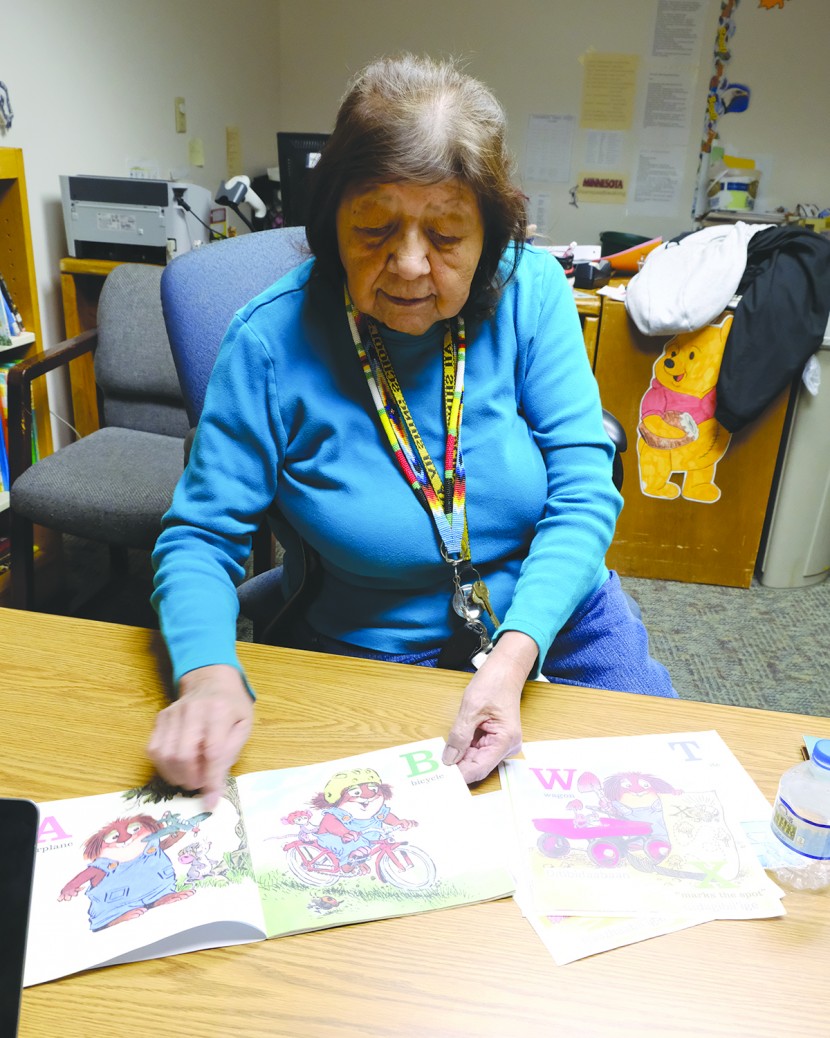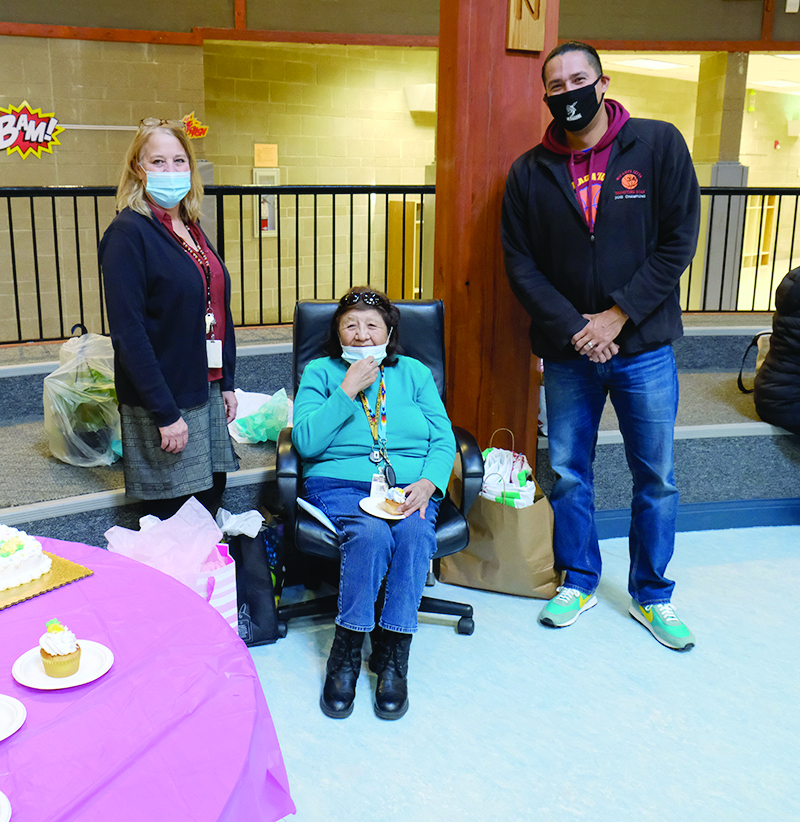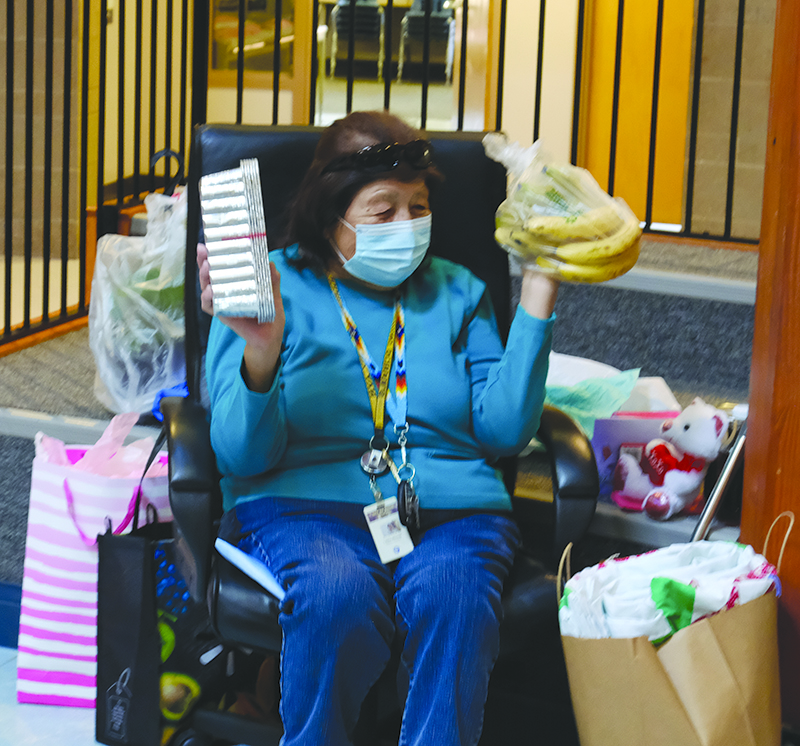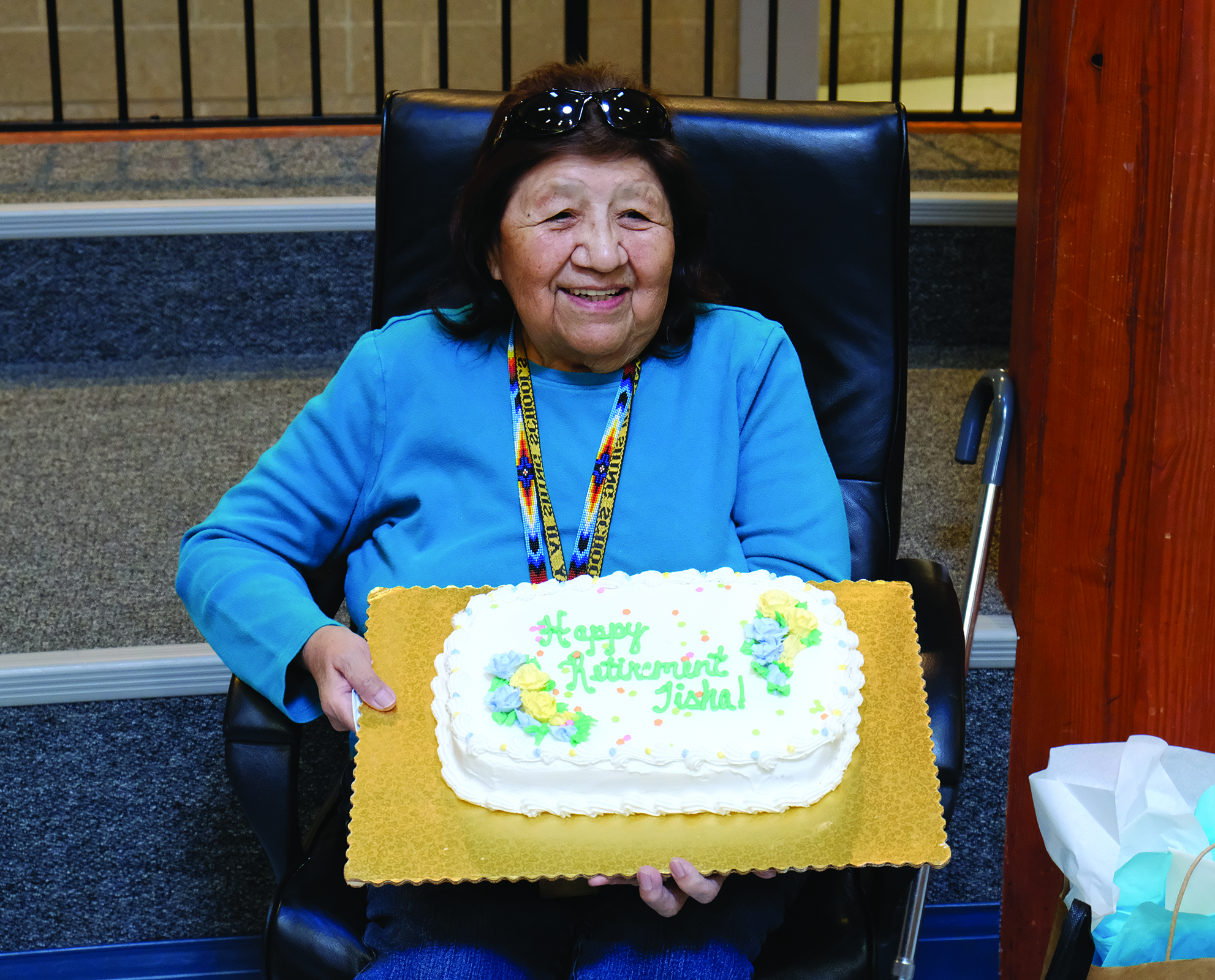
Letitia (Tisha) Mitchell retired last month at the age of 81 years young, after 46 years at Nay Ah Shing Schools and another 15 at other jobs in the Twin Cities and District I. With that kind of resume, it"s no surprise that Letitia has never shied away from a challenge.
As a child, she tagged along behind her dad when he hunted, trapped, and ice fished in the dead of winter.
As a teenager, she left her comfort zone of the reservation to finish high school at St. Benedict's.
As a young woman, she led a work crew of 15 rambunctious boys as they cleaned up Elders' yards.
As an adult, she became a teacher of the Ojibwe language at Nay Ah Shing — and when a more qualified speaker came along, she took on a new challenge as the school's librarian.
She faced it all with a sense of humor that still comes through in her hearty laugh and charming stories of a life lived to the fullest.
School days
Letitia, the eldest daughter of John and Nancy (Benjamin) Garbow, grew up on the west side of the highway near where the casino and Grand Market are today. (The Garbows still have allotted land there, Letitia said.) She lived with her brothers Reginald and Myron and her sisters Alicia (now Skinaway), Natalie (now Weyaus), Myrna (Sam), and Dorinda.
They lived in a house with no plumbing. "We had to carry water about a mile. It wasn't too bad during the winter, but in the summer we had to use pails. There was a pump up where my grandfather lived."
Her grandfather, John Benjamin, lived up the road and had a huge garden with every vegetable under the sun.
Her neighbors included the Pendegayoshes (Nancy's sister's family), the Clarks, and the Bedauskys.
During World War II, her dad worked as a welder in the shipyards at Duluth, and Letitia started school as the only Indian child in her class. "I spoke mostly Ojibwe, so when I started school there, when the teacher would say a word we had to learn, we would repeat it. And when I had to repeat it, I would say it in Ojibwe, too. She finally got mad at me and said, 'We're only learning English here.' I can remember it like it just happened yesterday."
Letitia — who punctuates each story with infectious laughter — was not one to give up so easily. During recess, her classmates would ask her how to say different words in Ojibwe, and she would tell them. "But we were really secretive, so the teacher wouldn't hear!"
When her dad was injured, losing the vision in one eye, the family came home on a train to Brainerd. Letitia attended school on the reservation and in Onamia — until the nuns at Little Flower Mission offered her the chance to attend St. Ben's. Letitia was up to the challenge, even though it made her one of only two Native Americans at the private Catholic school. "I wanted to go, because I always liked to challenge myself," she said.
Gap year
"When I graduated from St. Ben's, I came home and said, 'I'm not gonna do anything for a whole year. All I'm gonna do is go fishing and hunting." In the winter, she and her dad would get up at 5 a.m. to go ice fishing off Shawboshkung Point. Their "alarm clock" that told them it was time to quit was the school bus that went by around 7:30. "Then we'd pull up our lines and say, it's time to go home!" They'd cover their holes with snow, so the next day it would be easy to chisel through. "I think I ate fish for breakfast just about every other day during the winter."
One morning, however, Letitia got skunked. "My dad, he caught two or three of them, so I thought, 'Oh boy, we're gonna have fish anyway.' So we got home and he was just busy filleting and cleaning those fish. I said, 'Are you gonna give me some fish?' and he said, 'No, if you want fish you gotta catch your own!' so I said, 'Okay,' and I went without fish that day. It just so happened we went fishing again and I said, 'I'm gonna make sure I catch some, and I hope he doesn't,' and then sure enough, he didn't catch any! I said, 'What's wrong? Can't catch anything?' and he said, 'I'm gonna try over there,' and I thought, 'Yeah, pound on that ice some more, and chase all the fish away!' And then finally when the school bus went by, I said, 'Okay, it's time to quit,' and he was still over there trying, and he still couldn't catch any."
As Letitia filleted her fish, her mom asked if her dad caught any, and Letitia said, "No, he got skunked today. Too bad, he's not getting no fish." Her mom just hummed, and Letitia fried up her fish on the wood stove. "After I got done, I said, 'Oh, I'm so full, I don't think I'll be able to eat that one. You can have some.' But my ma wasn't so much of a fish eater, so she said, 'John, do you want some fish?' and he said, 'Yeah, okay.'"
Letitia also remembers mink hunting in the winter with her father. "That was where they got most of their money during the winter," she said. "They trapped for mink and muskrats." One day John showed her the tiny nose of a mink popping out of the water to breathe. "Do you see that? Now he'll go back down again. So this time when he comes up, I'm gonna shoot at him. And don't move!' And then pretty soon that little tip of that nose came up."
He shot it perfectly through the nose so it didn't ruin the pelt, then waded in and reached into the icy water to retrieve it. "Even though he had just one eye, oh, that guy was a crack shot!" said Letitia.
After her "gap year," there were no jobs at the reservation, so Letitia decided to go to the Twin Cities to work, where she had spent a summer in a sewing factory. She took a job at the Salvation Army, and had her own apartment. "But then I got bored!" she laughed. "I got tired of city life. I said, 'I think I'm gonna quit working here and move home.' And I've been around the rez since!"
Working girl
Her first job was with a program called Community Youth Services, where she supervised a work crew of 15 boys cleaning up Elders' yards. "They couldn't use lawn mowers or anything that was sharp. But they had to work! We'd go to the Elders' homes and pick up garbage."
One day they decided to build a ball field on her grandfather's hayfield, so that evening everyone came with their lawnmowers, mowed the field, and played ball.
Next, Letitia worked for Adult Basic Education for seven years, helping fellow Band members get their GEDs. When the Band took over the program from the state, Letitia became a cook for Head Start and Nay Ah Shing, which was newly opened in the old center where the casino parking lot is today. On weekends, she'd tend bar and cook at Drift Inn.
In 1967, Letitia married the late Ralph Mitchell, and had two children: a son, Thomas, who lives in District I, and a daughter who passed away tragically at age 12.
One day, when Letitia was recovering from hip replacement surgery, Millie Benjamin called and asked her to attend an Ojibwe language workshop with the University. Millie wanted someone to take the training with her, and once again — even though she was still laid up — Letitia was up to the challenge. "They started that training, and that language professor, she was supposed to be our trainer, but I think she learned more from us than we learned from her. I said, 'When is she gonna start to train us?'" (With another big laugh!)
One of Letitia's successes as an Ojibwe teacher came when a high school English teacher told her the kids didn't read well when they got to the upper school. Letitia started teaching the kids to read Ojibwe words and found that their skills transferred to English. She would single them out for positive attention whenever one of her students learned a new word — and their faces would light up. The English teacher said, "Letitia! What are you doing with those kids? Their reading is really coming up!"
When Millie's brother, Norman Clark, was interested in a teaching job, Letitia moved over to the library. "He was a real fluent Ojibwe speaker, so they asked if it would be all right if they let him take over. I told him, 'Oh yeah, sure, I'll work at a library, because I'm really not that fluent at Ojibwe. He'd be a better teacher."
Around that time, Letitia used to play bingo down by St. Cloud, and she became an expert at the crane games. She would win all kinds of toys for a quarter each and bring them to Head Start and Nay Ah Shing for the kids as rewards for reading books — or just for coming to school. Soon she found a whole collection of stuffed animals at a garage sale for a quarter each, and she brought those in as well, always making sure she had enough for everyone.
Letitia became famous with generations of Nay Ah Shing students for those gifts and incentives. "I had to hit a lot of garage sales, but I always made sure I never paid any more than a quarter!" she laughed.
With no need for recognition, Letitia went above and beyond, giving extra help to students with learning difficulties, coming up with bookmaking or portfolio projects for young readers, helping college kids who stopped in at the library, or finding materials for parents. "I did all kinds of things. I was spread all over!" she laughed. "If it was something I didn't know how to do, I would challenge myself and do it."
Letitia's namesake, Nay Ah Shing Principal Lehtitia Weiss, told a story at Letitia's graduation party on December 3 that demonstrates her impact. "Sometimes I'll see a student with a book in the hall outside Letitia's room and I'll say, 'Do you want to read with me?' and they'll say, 'No, I'm waiting for Tisha.'"
Letitia will be missed, and her impact on students and colleagues won't be forgotten.
Enjoy your retirement, Letitia! You've earned it!



Photos: Letitia Mitchell was honored for 46 years of service to Nay Ah Shing Schools on Thursday, December 3. Among the well-wishers were Commissioner of Education Joyce Shingobe and Chief Executive Melanie Benjamin and (pictured above) Nay Ah Shing Principal Lehtitia Weiss and Assistant Principal Byron Ninham. Letitia was famous for her baking power biscuits (made from scratch with no recipe), and her banana bread, which she regularly brought to share with co-workers.